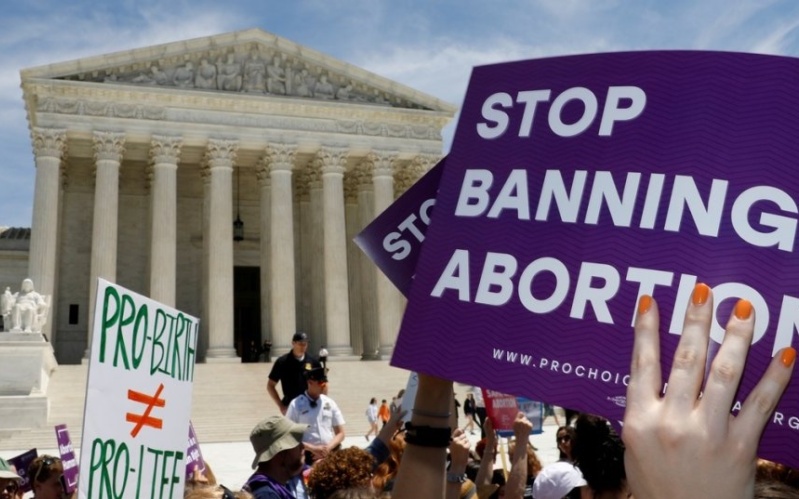Abortion rights activists outside the US Supreme Court, Washington, D.C., May 21, 2019 (Kevin Lamarque/Reuters)
As expected, Senate Republicans have blocked legislation to guarantee abortion rights throughout the US.
The bill to enshrine the 1973 Roe v. Wade precedent in federal law failed 49-51. Democrat Sen. Joe Manchin of West Virginia joined all 50 Republicans in opposition.
Sixty votes were needed to bypass the Republican filibuster of hte measure.
The Senate’s Democratic leadership took up the legislation after the leak of a draft majority Supreme Court ruling, by arch-conservative Justice Samuel Alito, which overturns Roe v. Wade and hands decisions on abortion rights to state legislatures — more than half of whom, controlled by Republicans, are sharply restricting or banning the procedure.
See also EA on Monocle 24: Can Abortion Rights Be Restored in US?
Why Supreme Court’s Draft Abortion Ruling is a Legal and Political Disaster
Democrats expected the rejection. They are hoping to use it to galvanize support in November’s mid-term Congressional elections.
“This vote clearly suggests that the Senate is not where the majority of Americans are on this issue,” said Vice President Kamala Harris, who presided over the opening of the vote. “A priority for all that care about this issue — the priority — should be to elect pro-choice leaders.”
Majority Leader Sen. Chuck Schumer of New York said:
Elect more pro-choice Democrats if you want to protect a woman’s freedom and right to choose. Elect more MAGA Republicans if you want to see a nationwide ban on abortion, if you want to see doctors and women arrested, if you want to see no exceptions for rape or incest.
Minority Leader Mitch McConnell of Kentucky said, without supporting evidence, that the bill would allow abortion on demand at any stage of pregnancy: “As extreme as extreme gets.”
In a Pew Research Center survey in March, 61% of respondents believed abortion should be legal in all or most cases; 37% were opposed.
The Women’s Health Protection Act would have protected abortion access nationwide. It prohibited many restrictions, including some that have been enacted by states since Roe v. Wade.
Manchin and two Republican Senators, Susan Collins of Maine and Lisa Murkowski of Alaska, said they supported abortion rights but argued that the bill was too expansive in rolling back restrictions.
Collins and Murkowski proposed a narrower bill that would ban any limit putting “undue burden” on a woman’s right to obtain an abortion — language from the 1992 Supreme Court decision in Planned Parenthood v. Casey that upheld Roe v. Wade and blocked any prohibition on abortions before fetal viability.
Democrats said the Collins-Murkowski bill lacked clear guidance about what state legislatures can and cannot do, failing to rule out abortion bans before a fetus is viable or to bar any specific prohibitions on abortion methods.
Before the vote, a group of House Democrats marched across the Capitol chanting, “My body, my decision.”
Sen. Patrick Leahy of Vermont said, “Here we are today, a body of 100 — 76% of which are male — making decisions about the private lives of the nearly 168 million women in this country. That’s ludicrous.”
Sen. Patty Murray of Washington summarized, “Here’s my message to Republicans. Women will not forget your cruelty.”
After the vote, President Joe Biden said the opposition to abortion rights “runs counter to the will of the majority of the American people”.
He urged voters to elect senators who support the Women’s Health Protection Act: “If they do, Congress can pass this bill in January, and put it on my desk, so I can sign it into law.”

